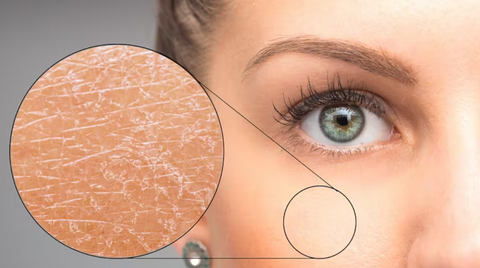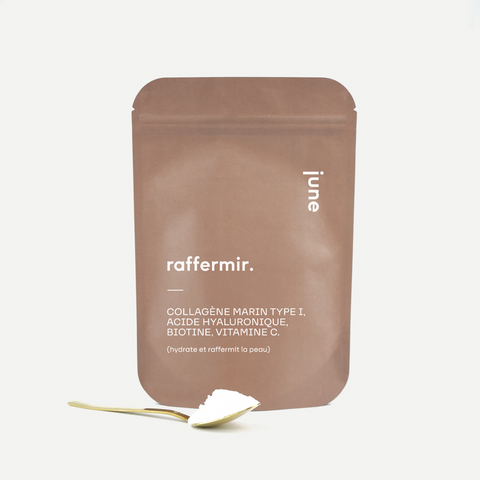How to effectively moisturize dry skin?
Dry skin is a common problem affecting millions of people around the world. It is characterized by a feeling of tightness, roughness, flaking, and sometimes even redness. Insufficient hydration can affect not only the appearance of the skin, but also its overall health. In this article, we will explain how to effectively moisturize dry skin by analyzing the causes of dehydration, best practices to adopt, and the right products to restore and maintain your skin's moisture.
Why does skin become dry?
Before we get into solutions, it's essential to understand why skin becomes dry. Dry skin, also called xerosis , often results from water loss in the outer layer of the skin, the epidermis. This dehydration can be caused by several factors:
- Weather conditions : Cold, wind, and dry air in winter or air-conditioned environments contribute to the evaporation of moisture from the skin.
- Age : As we age, sebum production decreases, impairing the skin's ability to maintain its natural moisture.
- Using harsh products : Some harsh soaps and cleansers can strip the skin of its natural oils, disrupting its protective hydrolipidic film.
- Prolonged hot showers : Hot water, while pleasant, also strips lipids from the skin, leaving it dehydrated.
- Health problems : Certain conditions such as eczema or psoriasis can worsen dry skin.

The effects of dry skin on the epidermis
When skin is dry, its hydrolipidic film is weakened, making it more vulnerable to external aggressions. As a result, the skin becomes rough, losing its elasticity and radiance. In more severe cases, cracks or fissures may appear, creating an entry point for bacteria, which can lead to irritation or infection.
How to effectively moisturize dry skin?
Hydrating dry skin isn't just about applying moisturizer. It's a comprehensive process that requires tailored skincare, as well as attention to your diet and daily routine. Here are the key steps to effectively hydrate and nourish your skin.
1. Choose the right moisturizers
Choosing the right products for your skin is crucial. Not all moisturizers and lotions are created equal, and some contain ingredients better suited to restoring moisture to dry skin.
The ingredients to look for are:
-
Hyaluronic Acid : This ingredient is a powerful moisturizer capable of holding up to 1000 times its weight in water. It helps fill the spaces between skin cells, boosting its ability to retain water and stay hydrated.
- Glycerin : This humectant attracts water into the skin and helps maintain its hydration throughout the day.
- Ceramides : These natural lipids help strengthen the skin barrier, reducing transepidermal water loss.
- Shea butter and sweet almond oil : These nourishing agents repair the skin's hydrolipidic film, providing additional protection against external aggressions.
The Marine Collagen - Anti-Aging Formula you can see in the image is an excellent choice for deeply moisturizing dry skin. In addition to moisturizing, it improves skin elasticity thanks to its richness in hyaluronic acid and vitamin C, promoting a brighter complexion and more supple skin.

2. Gently exfoliate to remove dead cells
Exfoliation is an often overlooked but essential step for dry skin. When dead skin cells build up on the skin's surface, they form a barrier that prevents moisturizers from properly penetrating. Therefore, it's important to exfoliate regularly to reveal softer skin that's more receptive to moisturizers.
However, for dry skin, it's important to use a gentle exfoliant that won't further damage the skin. Overly abrasive mechanical exfoliants should be avoided in favor of enzymatic exfoliants or gentle acids, such as lactic acid, which remove dead cells without damaging the skin barrier.
3. Moisturize as soon as you get out of the shower
One of the best times to moisturize is right after showering, when your skin is still slightly damp. Applying moisturizer immediately after showering helps seal moisture into your skin, boosting the product's effectiveness.
It's recommended to opt for a rich cream, such as one containing essential fatty acids or ceramides, to provide long-lasting hydration. If you prefer a lighter solution, a serum containing hyaluronic acid can be a great alternative.
4. Drink enough water
Internal hydration is just as important as external hydration. To maintain well-hydrated skin, it is essential to drink enough water throughout the day. Insufficient water intake not only dehydrates the body, but also the skin, which becomes drier and more fragile.
Although water intake depends on individual needs, it is generally recommended to drink around 1.5 to 2 liters of water per day to maintain good skin hydration.
5. Eat a nutrient-rich diet
A balanced diet is key to healthy, well-hydrated skin. Certain nutrients play an essential role in skin health, including:
- Omega-3s : These essential fatty acids, found in oily fish like salmon or flaxseeds, help strengthen the skin barrier and retain moisture.
- Vitamin E : This is a powerful antioxidant that helps protect skin from free radical damage and maintain moisture. Almonds, avocados, and vegetable oils are good sources.
- Vitamin C : It is crucial for the production of collagen, a protein that maintains the structure and elasticity of the skin. Marine Collagen - Anti-Aging Formula contains vitamin C, in addition to hyaluronic acid, for a combined action that helps hydrate and firm dry skin.
6. Protect the skin from external aggressions
Environmental factors, such as UV rays, cold weather, and pollution, can alter the skin barrier and worsen dry skin. It is therefore essential to protect your skin with appropriate care:
- Use sunscreen : Even in winter, it's important to protect your skin from UV rays, which can not only cause long-term damage but also dry out the skin. Choose a moisturizing sunscreen with an SPF of at least 30.
- Wear appropriate clothing : During cold periods, it is recommended to protect your skin with clothing made from natural fabrics, such as cotton or silk, which allow the skin to breathe while protecting it from external aggressions.
7. Avoid showers that are too hot and too long
If you have dry skin, it's important not to take showers that are too hot or too long, as hot water strips the skin's natural oils. It's best to take lukewarm showers and then immediately apply moisturizer to seal in the moisture.
8. Good habits to adopt on a daily basis
To maintain well-hydrated skin, some simple steps can make all the difference. Here are some tips to adopt on a daily basis:
- Use a humidifier : If you live in a dry environment, using a humidifier can help maintain sufficient humidity in the air, which helps prevent skin dehydration.
- Avoid harsh products : Choose gentle, sulfate-free soaps and avoid products containing alcohol, which can dry out the skin.












